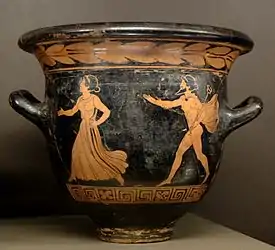Herse of Athens
Herse (Ancient Greek:Ἕρση means "dew") was a figure in Greek mythology, daughter of Cecrops, sister to Aglauros and Pandrosos.[1] Cephalus of Athens is the son of Hermes and Herse who suffers a tragic ending to his happy marriage with Procris.[2][3]
Mythology
Erichthonius
According to the Bibliotheca, when Hephaestus unsuccessfully attempted to rape Athena, she wiped his semen off her leg with wool and threw it on the ground, impregnating Gaia. Athena wished to make the resulting infant Erichthonius immortal and to raise it, so she gave it to three sisters, Herse, Aglauros and Pandrosos, in a willow basket and warned them to never open it. Aglauros and Herse disobeyed her and opened the basket which contained the infant and future king, Erichthonius, who was somehow mixed or intertwined with a snake. The sight caused Herse and Aglauros to go insane and they jumped to their deaths off the Acropolis. Shrines were constructed for Herse and Aglauros on the Acropolis.[4][5]
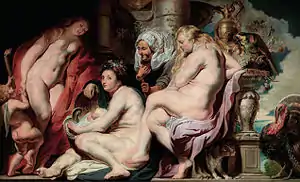
An alternative version of the story is that, while Athena was gone bringing a limestone mountain from the Pallene peninsula to use in the Acropolis, the sisters, minus Pandrosos again, opened the box with Erichthonius inside. A crow witnessed the opening and flew away to tell Athena, who fell into a rage and dropped the mountain (now Mt. Lykabettos). Once again, Herse and Aglauros went insane and threw themselves to their deaths off the cliffs of the Acropolis. This story supposedly inspired an ancient ritual in Athens: "The Festival of the Dew Carriers" or Arrhephoria.
Jealous sister
Some authors, such as Ovid in his Metamorphoses and Ars Amatoria, wrote a different end for Herse and Aglauros. Ovid tells in Book 2 of his Metamorphoses that Erichthonius was born without a mother. Pallas Athena (better known as Athena, Minerva is her Roman name) placed him in a willow basket and told the sisters not to look on the mysteries. Two daughters, Herse and Pandrosos obeyed, but Aglauros looked and saw the child lying next to a great snake. Cornix, the crow, told Athena, who turned her feathers from white to black for her pains. Later in Book 2, Hermes (Mercury in Roman mythology) is in Athens and sees a festival to Athena. He falls in love with Herse and goes to her house to ask for her hand. Aglauros agrees to give Herse his message for the price of gold. Athena sees all of this and goes to the house of Envy and orders the goddess to poison Aglauros. Aglauros, who begins to waste away with jealousy, blocks the passage to Herse's room and refuses to move. Hermes, angry at Aglauros for breaking her promise, changes her into a black marble statue.[6]
Gallery
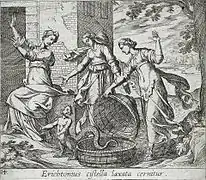 Erichthonius Released from His Basket by Antonio Tempesta (1606)
Erichthonius Released from His Basket by Antonio Tempesta (1606)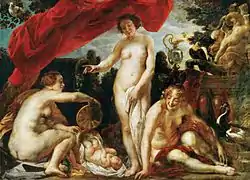 Daughters of Kekrops Finding Erichthonios by Jacob Jordaens (1640)
Daughters of Kekrops Finding Erichthonios by Jacob Jordaens (1640)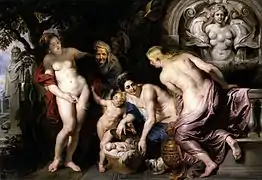 The Discovery of the Child Erichthonius by Peter Paul Rubens (circa 1615)
The Discovery of the Child Erichthonius by Peter Paul Rubens (circa 1615)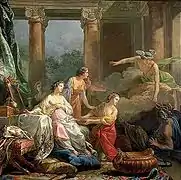 Mercury, Herse and Aglauros by Jean-Baptiste Marie Pierre (1763)
Mercury, Herse and Aglauros by Jean-Baptiste Marie Pierre (1763)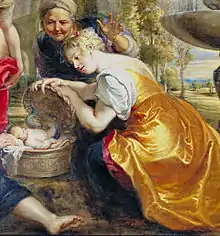 Finding of Erichthonius by Peter Paul Rubens (between 1632 and 1633)
Finding of Erichthonius by Peter Paul Rubens (between 1632 and 1633)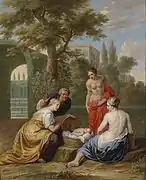 The finding of the infant Erichthonius by Cecrops's daughters by Willem van Herp (circa 1650))
The finding of the infant Erichthonius by Cecrops's daughters by Willem van Herp (circa 1650))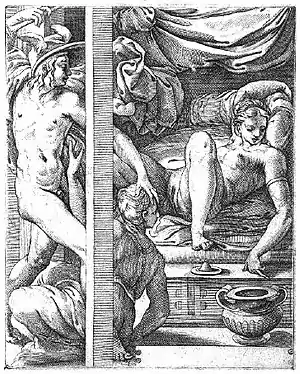 Mercury and Herse from the series “Götterlieben” (Prinmaking), Hamburg.
Mercury and Herse from the series “Götterlieben” (Prinmaking), Hamburg.
Notes
| Wikimedia Commons has media related to Herse. |
- Pausanias, Graeciae Descriptio 1.2.6
- Pseudo-Apollodorus, Bibliotheca 3.15.1
- Ovid, Metamorphoses 7.675-863
- Pseudo-Apollodorus, Bibliotheca 3.14.6
- Hyginus, Fabulae 166
- Ovid, Metamorphoses 2.708-832
References
- Gaius Julius Hyginus, Fabulae from The Myths of Hyginus translated and edited by Mary Grant. University of Kansas Publications in Humanistic Studies. Online version at the Topos Text Project.
- Pausanias, Description of Greece with an English Translation by W.H.S. Jones, Litt.D., and H.A. Ormerod, M.A., in 4 Volumes. Cambridge, MA, Harvard University Press; London, William Heinemann Ltd. 1918. Online version at the Perseus Digital Library
- Pausanias, Graeciae Descriptio. 3 vols. Leipzig, Teubner. 1903. Greek text available at the Perseus Digital Library.
- Pseudo-Apollodorus, The Library with an English Translation by Sir James George Frazer, F.B.A., F.R.S. in 2 Volumes, Cambridge, MA, Harvard University Press; London, William Heinemann Ltd. 1921. Online version at the Perseus Digital Library. Greek text available from the same website.
- Publius Ovidius Naso, Metamorphoses translated by Brookes More (1859-1942). Boston, Cornhill Publishing Co. 1922. Online version at the Perseus Digital Library.
- Publius Ovidius Naso, Metamorphoses. Hugo Magnus. Gotha (Germany). Friedr. Andr. Perthes. 1892. Latin text available at the Perseus Digital Library.
